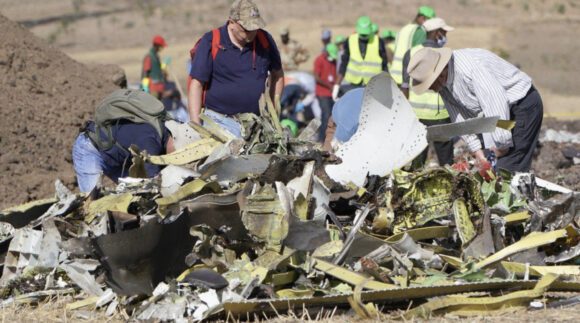
2024 07 31 171925
Boeing recognized the importance of an outsider as its next CEO, and landing Kelly Ortberg, who formerly led Rockwell-Collins, fits the bill. There are several reasons that an outsider was needed:
Boeing has a credibility gap with the industry that an outsider could solve
A “review and report” to customers and suppliers would be welcomed, particularly with honest estimates of what changes will take place and what progress has been made. Suppliers have been yo-yo’ed by estimates that appear to be wishful thinking and are bracing for an inevitable “de-stocking” at Boeing, which has been ordering supplies for 38 units while producing in the low 20s. How long can Boeing withstand the cash flow pressure of building inventories while it cannot deliver the appropriate number of aircraft?
Since the answer isn’t indefinitely, some more realistic expectations for the supply chain would be appreciated before a sudden shut-off could become necessary. Burning $4 billion a quarter isn’t chicken feed and can’t go on for long. While we hope Boeing can ramp up by year-end, we’ve heard the 38-per-month target for a few years. Boeing is currently running at a little over half that rate. Since the production process is under FAA control, can Boeing even make an accurate prediction now? If not, say so and provide more realistic guidance for suppliers and customers sooner rather than later. A smoother ramp-down is better than a shut-off if a de-stocking is to occur.
The toxic culture on quality needs to change, something only an outsider can accomplish
Whistleblowers should be celebrated for their contribution to safety rather than vilified. Nobody wants to build unsafe airplanes. But when errors are found, they should be corrected. That hasn’t happened at Boeing, as the culture hasn’t supported the truth. It needs to, period. Clearly stating that and walking the walk, rather than talking, is required. There is a reason the FAA has Boeing under a microscope, and a good part of it is corporate culture. An outsider can come in without the baggage of the existing culture and work to effect cultural change.
A new broom can sweep clean.
Somehow, the line management level at Boeing seems to be evaluated on financial performance rather than quality, safety, and productivity. Doing things right the first time is essential for success in all four above. An outsider can change how the key middle management is evaluated and rewarded, which will ripple through the organization. Measure people on quality, and they will pay attention.
The new broom can also sweep in transparency to Boeing operations. In recent years, with program after program, we’ve heard that everything is going well until suddenly, typically at an earnings call, it isn’t. Nobody likes surprises, and improved transparency into programs and milestones would go a long way with customers and the supply chain. Only announcing bad news on earnings calls when the company is forced to is not a good image.
There is a lot to do, and too few resources – so setting priorities is critical.
The new CEO is in a turnaround situation, even though many feel Boeing is too big to fail. It isn’t. There are three models in certification efforts: the need to replace the MAX with next-generation technology, the need to recapture the middle of the market that Boeing invented with the 757 and 767, and fixing the troubled 767-based KC-46A tanker and its vision system. Virtually every aircraft in Boeing Commercial Airplanes has quality issues, including the 787. The same is true for defense, where fixed-priced contracts have been overrun with costs Boeing will need to eat. At least Boeing services are profitable and growing.
- Setting tangible priorities would likely show the MAX production process
- Followed by the certification of the -7 and -10 ASAP
- Keeping the 787 on target with no further quality issues, production can be resumed at 5 per month in December.
- Certifying the 777X and fixing the KC-46A.
But all need to be worked on simultaneously, and resources realigned when tasks are completed.
The intangible priorities are culture change, which needs internal transparency, external transparency, and honesty with customers and suppliers. There is nothing wrong in saying “I don’t know” if that is true, particularly during a honeymoon period during which answers can be sought. Currently, Boeing has a problem with listening to its customers, suppliers, and stakeholders.
The arrogant attitudes that resulted from years of market leadership remain in a culture that hasn’t earned them but banked on the reputation gained by prior generations. Attitudes also need to change to one of humility and hard work to once again become the company everyone looks up to. That will also require innovation and taking risks, which hasn’t happened since the launch of the 787 and the “no more moonshots” strategy.
The Bottom Line:
Everybody understands Boeing’s problems and the need to solve them quickly but effectively. The pandemic and great retirement didn’t help, eliminating a generation of experienced workers who cannot be replaced promptly. Without the right people in place, the turnaround becomes more difficult.
The industry and the USA need a healthy and prosperous Boeing. However, that can only happen with strong leadership willing to question long-standing processes and attitudes and replace them with humility and hard work, with pride in being the best.
It all starts at the top, and we wish Kelly Ortberg the best in tackling what could become the most significant turnaround in corporate history, with hopes he can provide the leadership that Boeing needs.
Views: 7




